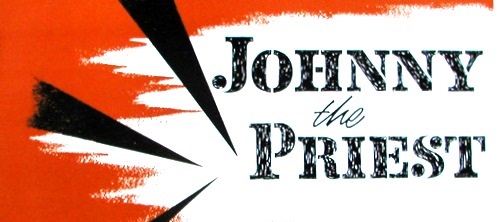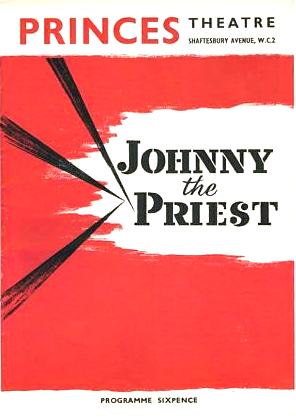
One of the most fascinating of 'real-life' British musicals, JOHNNY THE PRIEST told the story of a young vicar's attempt to improve the lives of teenagers living in a run-down London dockland. Acknowledged as one of the most innovative and inventive scores of the period, this terrific score with its superb big band arrangements by Gordon Langford emerges refreshened in Alan Bunting's immaculate sound restoration. Antony Hopkins' remarkable score catapulted the British musical into new territory, offering not only the best songs ever about ping-pong and wallpaper, but moments of great beauty.
In Maybury, somewhere in London's dockland, a young priest, the Revd. Richard Highfield (Jeremy Brett), does his best to put the youth of the district on the straight and narrow. The amount of energy he uses in his crusade concerns the church council, but his wife Mary (Stephanie Voss) supports him in his endeavours.
A young delinquent, Johnny (Bunny May), is one of the vicar's successes. Highfield gets Johnny into the Navy, but then the boy steals a telescope. He asks Highfield to give the police a false alibi, but Highfield cannot find it in his conscience to do so, and Johnny is thus put back to an uncertain future.
1 Johnny The Priest peut-être considéré comme un Flop musical
Adapted from 'The Telescope' by R. C. Sherriff.
Johnny the Priest was the first and only musical to be written by the 'serious' composer Antony Hopkins. The librettist, Peter Powell, had directed Sherriff's play The Telescope at Birmingham, and co-directed Zuleika at the Saville in 1957. Johnny the Priest was his first attempt at book and lyrics. The director Norman Marshall was an intelligent choice, with a reputation for 'people's' theatre. His involvement showed the Players management meant business, just as they had when they brought Jean Meyer from France to direct their production of The Crooked Mile. The resident designer and co-director (with his partner Don Gemmell) of the Players Theatre, Reginald Woolley, had also designed The Crooked Mile. As the programme stated 'Johnny the Priest has, as you will see, presented even greater problems, and he walked around the dock area of London with a camera before starting work on the designs'. Woolley's designs tended to be gloomy, and there is no doubt that he was the perfect choice for Johnny the Priest.
1. Doing the Bump
2. The Little Box
3. Vicarage Tea
4. Be Not Afraid
5. I'm Your Girl
6. Beyond the Narrow Streets
7. Rooftops
8. The Foggy Foggy Blues
9. He'll Let You Down
10. Ping Pong
11. Johnny Earn Peanuts
12. A Tanner's Worth of Tune
13. Charge Me
14. A Boy Called Johnny
15. Stormy Evening
Aucun dossier informatif complémentaire concernant Johnny The Priest
Aucun dossier informatif complémentaire concernant Johnny The Priest
• The theatre programme for Johnny the Priest carried an advertisement from Decca announcing the imminent appearance of the original cast recording. Unfortunately, Decca had Malcolm Arnold, not Hopkins, as the composer! Anyway, the recording, once made, was not issued, but put in the Decca archives. Only many years later was the recording issued in a limited edition.
• The 'teenagers' that make up the chorus are a patently bogus bunch, with thinly veiled RADA accents. The second female lead, Frances Buckeridge, is very East End until she has to go into her head voice, when she becomes very 'cut glass'
• Antony Hopkins does not list his score for Johnny the Priest among his works.
• Johnny the Priest was Jeremy Brett's last appearance in a musical play. It was Bunny May's only starring performance in a London musical (although he was one of the gaggle of young boys in Passion Flower Hotel a few years later). It was also Frances Buckeridge's one and only London lead.

Version 1
Johnny The Priest (1960-04-Shaftesbury Theatre-London)
Type de série: OriginalThéâtre: Shaftesbury Theatre (Londres - Angleterre)
Durée : Nombre : 14 représentationsPremière Preview : 19 April 1960
Première: 19 April 1960
Dernière: InconnuMise en scène : Norman Marshall • Chorégraphie : Anthony Bateman • Producteur : Star(s) : Avec: Cast: Jeremy Brett (Highfield), Stephanie Voss (Mary), Bunny May (Johnny), Hope Jackman, Frances BuckeridgeCommentaires longs: "Johnny the Priest” fut l'une des seules productions de l'époque à traiter des problèmes de la jeunesse moderne, faisant penser à "West Side Story" sur certains parallèles, l'atmosphère de la rue, la tension et la violence, les groupes de garçons et filles. Malgré tout, elle fut jugée comme "un échec sans espoir."
On put lire : "Johnny est un mélange gênant entre le réalisme, dans la veine de West Side Story, et le mélodrame du genre victorien le plus mièvre." "L'adaptation et les paroles sont signées Peter Powell, et bien que certaines paroles soient bonnes en elles-mêmes, on regrette vraiment qu'il ne se soit pas abstenu de faire sermonner si souvent en chanson, le Révérend Richard Highfield. On ne peut s'empêcher de plaindre Jeremy Brett et Stéphanie Voss de devoir chanter ces choses larmoyantes."
"Johnny the Priest" fut la première et la seule comédie musicale écrite par le compositeur Antony Hopkins. Sa musique - proche de celle de Benjamin Britten - est mélodieuse et agréable à écouter. Celle de "The Foggy Foggy Blues" par exemple est tout à fait obsédante et celle de "Vicarage Tea" est composée d'amusante façon. Dans cette pièce d'ailleurs, le seul vrai but de la musique doit être de permettre aux compagnons de Johnny, filles et garçons du quartier des docks, de créer une atmosphère débridée dans un environnement terne et misérable."Presse : Les critiques ne furent guère enthousiastes à l'égard de la pièce, tout en restant élogieuses sur la prestation de Jeremy Brett. D'après The Daily Mail,
"Jeremy Brett fait preuve d'une présence sur scène irrésistible, qui assure
pour beaucoup l'unité d'action de la pièce." Dans d'autres articles on pouvait
lire : "M. Jeremy Brett joue le pasteur avec sincérité, et chante très bien, des
chansons pas très passionnantes, mais certaines de ses lignes sont
terriblement personnelles, telles que : "Je ne fume pas moi-même, mais je
garde un petit nombre de cigarettes pour mes amis" ou "Les garçons, nous
devons trouver quelque chose d'intéressant à faire pendant ces longues
soirées." - The Times of London.
"La représentation d'hier soir a été très bien interprétée. Jeremy Brett, en
particulier, mérite des compliments pour sa prestation de Highfield. Le danger
de jouer un homme qui ne dira pas un mensonge pour sauver un ami, est
évident; une touche d'attitude moralisatrice et la sympathie du public est
perdue. M. Brett lui donne l'honorable simplicité qui nous convainc, que, pour
lui, une seule façon d'agir est possible. Enfin, et c'est une surprise pour moi, il
chante plutôt bien. " - W.A. Darlington.
"Jeremy Brett doit être félicité pour sa composition du jeune pasteur au coeur
noble et bien de sa personne, qui tente de lutter contre l'ennui des jeunes,
avec des vieux volumes de Punch, du ping-pong et des gants de boxe. On
frémit quand on pense à ce qu'aurait pu donner le rôle dans des mains moins
expertes. De cette façon, il a réussi à garder la sympathie et même à
émouvoir dans son dilemme final et son échec." - Theatre World, Mai 1960.
Pas encore de video disponible pour ce spectacle